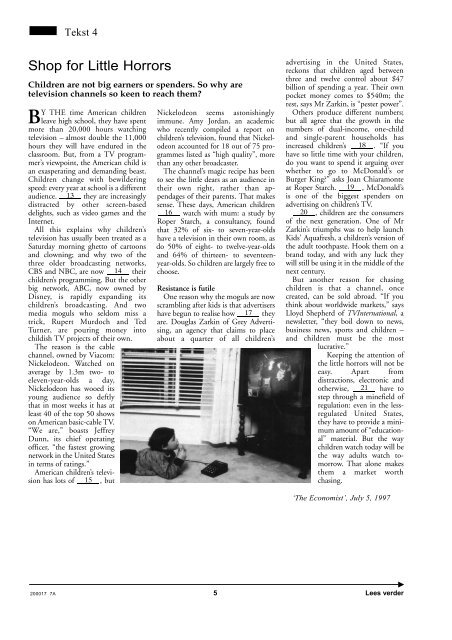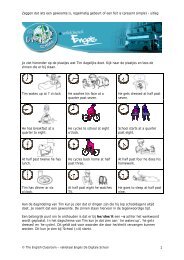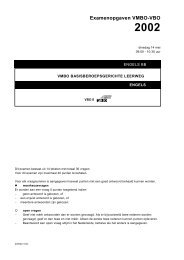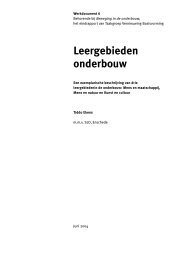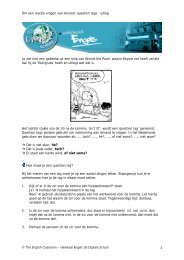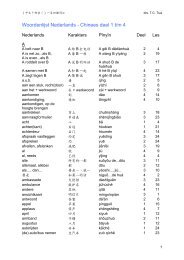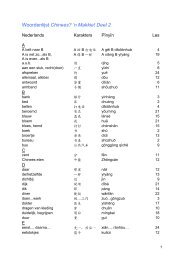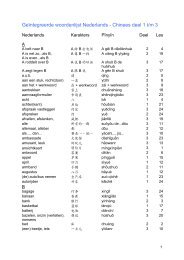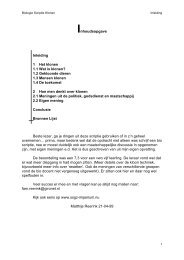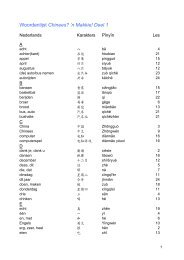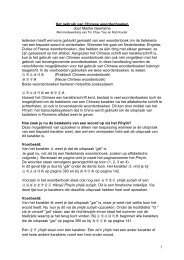Engels (nieuwe stijl en oude stijl) Examen HAVO - Examenbundel
Engels (nieuwe stijl en oude stijl) Examen HAVO - Examenbundel
Engels (nieuwe stijl en oude stijl) Examen HAVO - Examenbundel
Create successful ePaper yourself
Turn your PDF publications into a flip-book with our unique Google optimized e-Paper software.
Tekst 4<br />
Shop for Little Horrors<br />
Childr<strong>en</strong> are not big earners or sp<strong>en</strong>ders. So why are<br />
television channels so ke<strong>en</strong> to reach them?<br />
BY THE time American childr<strong>en</strong><br />
leave high school, they have sp<strong>en</strong>t<br />
more than 20,000 hours watching<br />
television – almost double the 11,000<br />
hours they will have <strong>en</strong>dured in the<br />
classroom. But, from a TV programmer’s<br />
viewpoint, the American child is<br />
an exasperating and demanding beast.<br />
Childr<strong>en</strong> change with bewildering<br />
speed: every year at school is a differ<strong>en</strong>t<br />
audi<strong>en</strong>ce. 13 they are increasingly<br />
distracted by other scre<strong>en</strong>-based<br />
delights, such as video games and the<br />
Internet.<br />
All this explains why childr<strong>en</strong>’s<br />
television has usually be<strong>en</strong> treated as a<br />
Saturday morning ghetto of cartoons<br />
and clowning; and why two of the<br />
three older broadcasting networks,<br />
CBS and NBC, are now 14 their<br />
childr<strong>en</strong>’s programming. But the other<br />
big network, ABC, now owned by<br />
Disney, is rapidly expanding its<br />
childr<strong>en</strong>’s broadcasting. And two<br />
media moguls who seldom miss a<br />
trick, Rupert Murdoch and Ted<br />
Turner, are pouring money into<br />
childish TV projects of their own.<br />
The reason is the cable<br />
channel, owned by Viacom:<br />
Nickelodeon. Watched on<br />
average by 1.3m two- to<br />
elev<strong>en</strong>-year-olds a day,<br />
Nickelodeon has wooed its<br />
young audi<strong>en</strong>ce so deftly<br />
that in most weeks it has at<br />
least 40 of the top 50 shows<br />
on American basic-cable TV.<br />
“We are,” boasts Jeffrey<br />
Dunn, its chief operating<br />
officer, “the fastest growing<br />
network in the United States<br />
in terms of ratings.”<br />
American childr<strong>en</strong>’s television<br />
has lots of 15 , but<br />
Nickelodeon seems astonishingly<br />
immune. Amy Jordan, an academic<br />
who rec<strong>en</strong>tly compiled a report on<br />
childr<strong>en</strong>’s television, found that Nickelodeon<br />
accounted for 18 out of 75 programmes<br />
listed as “high quality”, more<br />
than any other broadcaster.<br />
The channel’s magic recipe has be<strong>en</strong><br />
to see the little dears as an audi<strong>en</strong>ce in<br />
their own right, rather than app<strong>en</strong>dages<br />
of their par<strong>en</strong>ts. That makes<br />
s<strong>en</strong>se. These days, American childr<strong>en</strong><br />
16 watch with mum: a study by<br />
Roper Starch, a consultancy, found<br />
that 32% of six- to sev<strong>en</strong>-year-olds<br />
have a television in their own room, as<br />
do 50% of eight- to twelve-year-olds<br />
and 64% of thirte<strong>en</strong>- to sev<strong>en</strong>te<strong>en</strong>year-olds.<br />
So childr<strong>en</strong> are largely free to<br />
choose.<br />
Resistance is futile<br />
One reason why the moguls are now<br />
scrambling after kids is that advertisers<br />
have begun to realise how 17 they<br />
are. Douglas Zarkin of Grey Advertising,<br />
an ag<strong>en</strong>cy that claims to place<br />
about a quarter of all childr<strong>en</strong>’s<br />
advertising in the United States,<br />
reckons that childr<strong>en</strong> aged betwe<strong>en</strong><br />
three and twelve control about $47<br />
billion of sp<strong>en</strong>ding a year. Their own<br />
pocket money comes to $540m; the<br />
rest, says Mr Zarkin, is “pester power”.<br />
Others produce differ<strong>en</strong>t numbers;<br />
but all agree that the growth in the<br />
numbers of dual-income, one-child<br />
and single-par<strong>en</strong>t households has<br />
increased childr<strong>en</strong>’s 18 . “If you<br />
have so little time with your childr<strong>en</strong>,<br />
do you want to sp<strong>en</strong>d it arguing over<br />
whether to go to McDonald’s or<br />
Burger King?” asks Joan Chiaramonte<br />
at Roper Starch. 19 , McDonald’s<br />
is one of the biggest sp<strong>en</strong>ders on<br />
advertising on childr<strong>en</strong>’s TV.<br />
20 , childr<strong>en</strong> are the consumers<br />
of the next g<strong>en</strong>eration. One of Mr<br />
Zarkin’s triumphs was to help launch<br />
Kids’ Aquafresh, a childr<strong>en</strong>’s version of<br />
the adult toothpaste. Hook them on a<br />
brand today, and with any luck they<br />
will still be using it in the middle of the<br />
next c<strong>en</strong>tury.<br />
But another reason for chasing<br />
childr<strong>en</strong> is that a channel, once<br />
created, can be sold abroad. “If you<br />
think about worldwide markets,” says<br />
Lloyd Shepherd of TVInternational, a<br />
newsletter, “they boil down to news,<br />
business news, sports and childr<strong>en</strong> –<br />
and childr<strong>en</strong> must be the most<br />
lucrative.”<br />
Keeping the att<strong>en</strong>tion of<br />
the little horrors will not be<br />
easy. Apart from<br />
distractions, electronic and<br />
otherwise, 21 have to<br />
step through a minefield of<br />
regulation: ev<strong>en</strong> in the lessregulated<br />
United States,<br />
they have to provide a minimum<br />
amount of “educational”<br />
material. But the way<br />
childr<strong>en</strong> watch today will be<br />
the way adults watch tomorrow.<br />
That alone makes<br />
them a market worth<br />
chasing.<br />
‘The Economist’, July 5, 1997<br />
200017 7A 5 Lees verder


